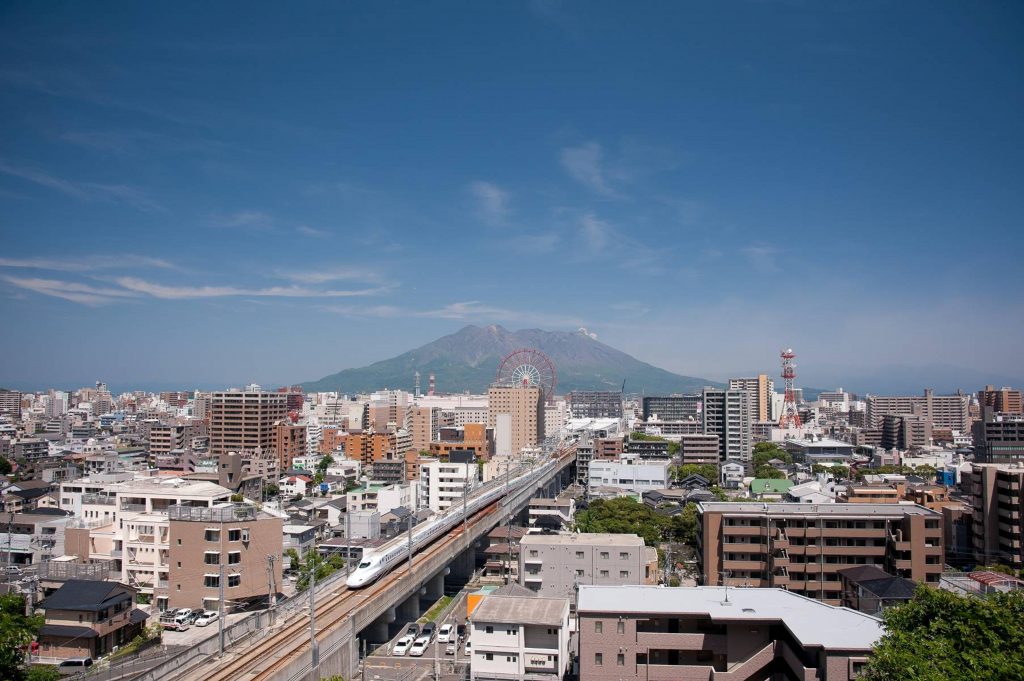Will Mapplebeck, Strategic Communications and Public Affairs Manager at Core Cities UK took part in JLGC’s annual Japan Study tour to Tokyo and Kagoshima in January 2023, looking at Japanese local government net zero policies for decarbonisation.
‘The Volcano is erupting again, but it’s OK…’

Urban area around the Kagoshima-Chūō Station with Shinkansen
Active volcanoes don’t tend to feature on UK Local Government Risk Registers, but in Kagoshima Prefecture in Southwest Japan, they have learned to live with Sakurajima, one of the country’s most active peaks.
Every summer, the citizens of Kagoshima City put up their umbrellas, not to protect against rain – the prefecture is one of the wettest and balmiest in the archipelago – but against the ash that the stratovolcano spews out, covering the city streets in fine grey powder.
There hasn’t been a big eruption since 1914, but every year the citizens of Sakurajima Island practice a full-scale evacuation to the mainland. Every day at 5 pm, council buildings play a soothing tune over a loudspeaker celebrating another day without an eruption.
But the prefecture has learned not only to live with the volcanic activity that has made it a magnet for tourists, it has learned to take advantage of it to generate clean, green electricity for its citizens.
Yamagawa Power Station uses steam extracted from reservoirs of boiling magma formed thousands of metres underground. As the Japanese say, it is a power generation system that ‘utilises the blessings of the earth’. The source is potentially limitless – although there are concerns from local people about the effects on the Onsen, the traditional steam baths which are also heated by geothermal activity.
This sustainable approach to energy generation can also be seen in Kagoshima City at the Nanbu Incineration Processing Plant. In it, citizens’ waste – which households sort into 19 separate categories before it is taken away by council staff – is burned, with the resulting steam powering a turbine to produce electricity. Elsewhere in the plant, food and paper waste is placed in huge fermentation tanks producing methane which is eventually used by locals to cook their food and heat their homes.
Both these plants form a key part of Kagoshima’s attempts to reach Net Zero, and the Nanbu plant is part-owned by the local prefecture. One of Kagoshima’s aims is to enhance the regional economy through the development of companies related to renewable energy and to attract new renewable energy businesses into the area.
Japanese local government enjoys freedoms and tax-raising abilities that UK councils can only dream of. Local spending outstrips national spending, with the role of the local state enshrined in Japan’s constitution. Central government handles currency, defence and diplomacy, everything else – including an active role in power generation – is left for the 47 prefectures and over 1,700 municipalities to get on with.
As well as climate change, the local state is heavily involved in tackling Japan’s other big problem, its shrinking and ageing population. There are legitimate worries about who will look after the country’s old and the health of the tax base in a country where immigrant workers are relatively rare. There is a specific strategy dedicated to ‘regional vitalisation’, with prefectures responsible for creating jobs, attracting people to their areas and creating the right environment for young people to marry and have children.
Like all great cities, Tokyo continues to attract people from across the country, but the government is increasingly worried about the effects of this on areas outside the capital. It recently offered young families one million yen per child (£7,500) to move out of Tokyo and into areas that are suffering population decline.
While targets on population and climate are set nationally, it is up to the local state to deliver with much of the revenue to pay for initiatives raised locally through taxes on everything from solar panels to golf courses.
Like the UK, Japan has a sense of growing urgency when it comes to climate change. Temperatures are rising faster than the rest of the world, with average temperatures in Tokyo increasing by 3.3 degrees between 1850 and 2020. Temperatures of 33 degrees and above are no longer uncommon in summer months.
Back in Kagoshima and the surrounding islands, Typhoons are increasingly unpredictable, along with heavier than usual snow and torrential rainfall. Yakushima Island has always been prone to rain – in Fumiko Hayashi’s novel Floating Clouds, Yakushima is described as a place where it ‘rains 35 days of every month’. But as with the volcano, locally led expertise is finding a way to live with and capitalise on these conditions.
Yakushima’s 12,000 residents’ electricity supply is entirely generated from the island’s rainfall. There is a hydroelectric power station generating 58,500kw of power thanks to the Odate Dam and a network of power stations spread across the island’s steep slopes. The plant also produces silicon carbide, which can be used in the semiconductor and solar cell industry.
In Kagoshima Prefecture, they are reaching their climate goals through a mix of innovation and adaptation, much of it thanks to an enabled local state. There is much for the UK to learn.
JLGC London each year invites senior executives in local government and staff working in the public sector within the jurisdiction of the countries covered by our office (the UK, Republic of Ireland and other countries within Northern Europe) to Japan for a week-long tour and series of seminars and workshops: to exchange best practice, opinions and information on the current state and issues of local autonomy, and to deepen understanding of each other’s local autonomy systems.
Future study tour details will appear here, the JST 2024 host authority and the tour theme will be decided during summer 2023.

